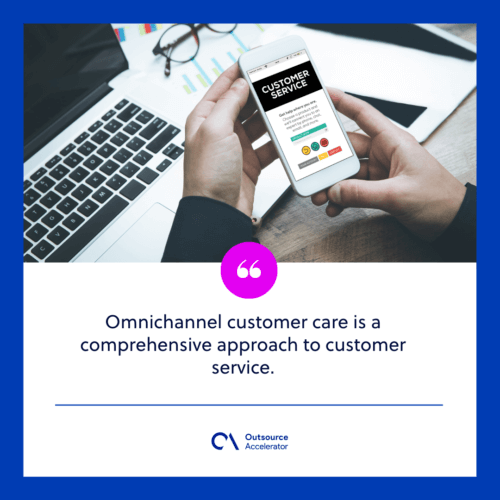10 best practices for omnichannel customer care

These days, customers expect seamless experiences across various touchpoints. Businesses need to meet these expectations to thrive in the competitive market landscape.
A key strategy for delivering exceptional customer care is adopting an omnichannel approach.
Softtek data shows companies with omnichannel customer care strategies retain 89% of their clients. Compare it to organizations with weak omnichannel strategies’ 33% customer retention rate.
Businesses must up their game and adopt the best omnichannel customer care practices to boost customer relationships.
Understanding omnichannel customer care
Omnichannel customer care is a comprehensive approach to customer service. It focuses on providing a seamless and consistent experience across multiple communication channels.
This approach recognizes that today’s customers interact with businesses through various platforms — whether through phone, email, chat, and social media.
Adopting omnichannel customer care allows companies to meet clients’ needs and preferences. It lets them offer flexibility and convenience that boost the client experience.

Benefits of omnichannel customer care
Implementing omnichannel customer care brings numerous benefits to organizations, such as:
Enhanced customer experience
Omnichannel customer care ensures a consistent customer experience regardless of the platform. It eliminates the frustration of repeating information and provides a personalized experience. An improved customer experience strengthens customer loyalty.
Boosts customer satisfaction
By offering multiple communication platforms, businesses can cater to customers’ preferences. This allows them to engage in the most convenient way possible.
This flexibility leads to higher customer satisfaction levels and improved brand perception.
Improves customer retention
Clients receiving seamless service across all channels are likelier to remain loyal to the brand. This reduces customer churn and increases the opportunity for repeat business.
Efficient issue resolution
Omnichannel customer care enables faster issue resolution. That’s because customers can choose the platform that best suits their needs.
This reduces the time and effort required to resolve client problems, leading to higher customer satisfaction rates.
Valuable customer insights
Collecting and integrating data from multiple channels helps firms comprehensively understand their customers.
This data can identify trends, preferences, and pain points that drive targeted and personalized client interactions.
10 best ways to implement omnichannel customer care
Now that we understand the benefits of omnichannel customer care, let’s explore the ten best ways to implement it successfully:
1. Create a unified customer journey
Map out the customer journey across all channels to ensure a unified experience. This involves aligning touchpoints, information flow, and messaging.
It lets you provide a consistent and seamless journey from one channel to another.
For example, a client starts an interaction on social media and later switches to live chat. The customer service representative should have access to the previous conversation to maintain context and avoid repetition.
2. Collect and integrate data from multiple channels
Gather and integrate customer data from all channels to create a comprehensive view of each client. This allows you to offer personalized recommendations, anticipate needs, and deliver more targeted support.
For instance, an omnichannel customer care system analyzes a buyer’s previous purchase history and browsing behavior.
You can then offer relevant product suggestions during a conversation. This increases the likelihood of a successful cross-sell or upsell.
3. Offer multiple communication channels
Provide options for communication platforms to accommodate customer preferences. This could include phone, email, live chat, social media, and messaging apps. A client who prefers communicating via social media should be able to contact customer support directly on the company’s social media account. Note that each channel should be seamlessly integrated and easily accessible to users.
4. Ensure consistent branding and messaging
Maintain consistent branding and messaging across all platforms to reinforce the business’ identity and values. This includes using the same tone of voice, visual elements, and key messages to create a cohesive brand experience.
People should feel a consistent brand image when interacting with a company’s website, social media pages, and customer support team.
5. Seamless channel transitions and context preservation
Enable customers to switch easily between channels without losing any information.
Customer context should be preserved regardless of the platform used. Support representatives should be able to continue where the client left off.
If a customer starts a conversation with a chatbot and later connects with a live agent, the agent should have access to the chatbot transcript to continue the conversation smoothly.
6. Leverage automation and artificial intelligence (AI)
Implement automation and AI technologies to handle routine and repetitive inquiries. Chatbots can provide instant responses, freeing human agents to focus on more complex issues. This results in more rapid responses and increased efficiency.
7. Empower customer service representatives
Equip customer service representatives with the knowledge, tools, and authority to resolve inquiries across all channels. Comprehensive training and clear guidelines empower agents to provide personalized support and make informed decisions.

8. Continuous monitoring and feedback collection
Regularly monitor and evaluate the effectiveness of your omnichannel customer care strategy. Leverage client feedback and analytics to identify areas for improvement, address pain points, and optimize their experience.
9. Agile adaptation and optimization
Be perceptive and adapt to evolving customer needs and market trends by continuously optimizing your omnichannel customer care strategy.
You should be open to adopting new technologies, channels, and best practices to remain competitive and deliver exceptional client service.
10. Proactive customer care and anticipating customer needs
Go beyond reactive support and aim for proactive customer care. Use customer insights and data to forecast their needs. By doing so, you can provide personalized recommendations, proactive support, and timely communication.
Partner with SPLACE BPO for omnichannel customer care services
Implementing omnichannel customer care can be challenging, but you can achieve exceptional results with the right partner.
SPLACE BPO specializes in providing comprehensive and seamless omnichannel customer care solutions.
This BPO company has all the tools and support a business needs to grow. Its seasoned experts will help you build relationships with your clients at every stage of their journey.
Visit SPLACE BPO’s website and see how they can get you started with your omnichannel customer care strategies.







 Independent
Independent




